It’s easy to stay busy with SEO activities.
However, not every tactic will yield your desired results.
This uncertainty can lead to a suboptimal effort and output.
How can you focus your time and resources where it really counts?
On April 14, I moderated a Search Engine Journal webinar presented by Ajay Rama of iQuanti.
Rama shared how to manage your SEO program more effectively.
Here’s a recap of his presentation.

As an SEO professional, you need to make several informed decisions to manage various stakeholders and run your SEO program effectively.
Key SEO initiatives can be organized based on the frequency and strategic impact, such as:
- Creating or optimizing new pages to improve visibility.
- Identifying new opportunities that can give maximum ROI and building a business case.
- Running strategic SEO projects like domain consolidation, site migration, etc.
Let’s look at a data-driven approach to improving rankings and evaluating SEO opportunities that can drive maximum business impact.
Improving Your Site’s Rankings
Increasing your rankings usually begins in one of two ways:
- Quantitative way: An SEO audit reveals the gaps in a page and the focus is to plug those gaps.
- Qualitative way: Update the content to align better with business goals and strategy.
But these typical approaches come with a set of challenges:
- Too many variables: It can be hard to figure out what is most impactful. Spreading efforts too thin can only impact several variables.
- Siloes: Content, authority, and technical aspects need to be in cohesion. But often, different teams are involved – content for content changes, PR and link teams for authority, and dev teams for technical changes. When teams approach each aspect independently, it results in sub-optimal output.
- Long turnaround time: It’s difficult to determine the impact of planned changes which leads to a lot of iterations for the same page.
- Business outcome disconnect: Management buy-in is a challenge as SEO lacks an ROI-linked business plan. Delayed results can lead to programs being called off or teams going through frustration.
Use this data-driven framework to improving your site’s rankings.
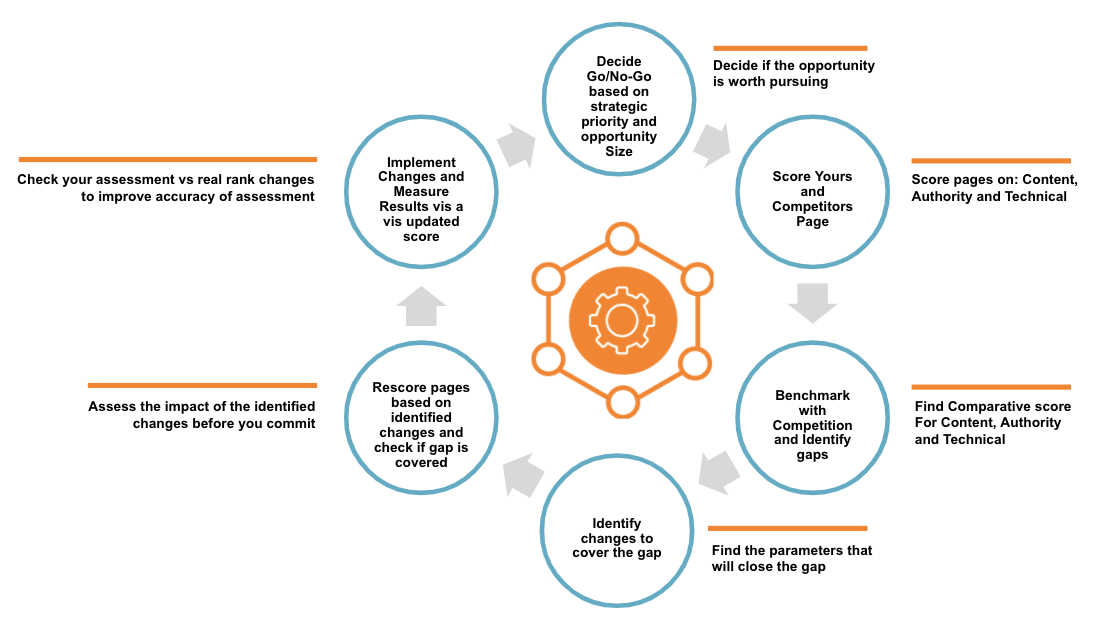
- Decide go/no-go approach based on strategic priority and opportunity size: Is the opportunity worth pursuing?
- Score your pages and competitors’ pages: Score pages on content, authority, and technical elements.
- Benchmark with competition and identify gaps: Compare your scores for content, authority, and technical elements against the competition.
- Identify changes to cover the gap: Find the parameters that will close the gap.
- Rescore pages based on identified changes and check if the gap is covered: Assess the impact of the identified changes before you commit.
- Implement changes and measure results vis-a-vis the updated score: Check your assessment vs. real rank changes to improve the accuracy of the assessment.
You can modify this framework in terms of what works for you.
Using a tool like Alps by iQuanti, you’ll be able to assign scores to content, authority, and technical elements, specifically:
- Content: Identify which keywords need minor improvement or major content revamp.
- Parameters:
- Content’s intent
- Subtopics covered
- Elements optimized
- Parameters:
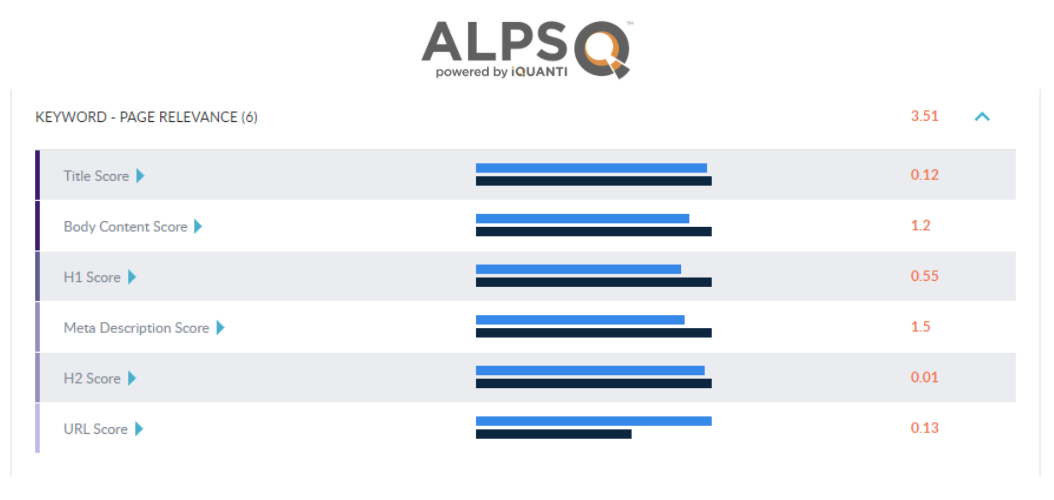
- Authority: Do a backlink audit.
- Parameters:
- Number of relevant backlinks
- Types of backlinks
- Authority of linking pages/domains
- Parameters:
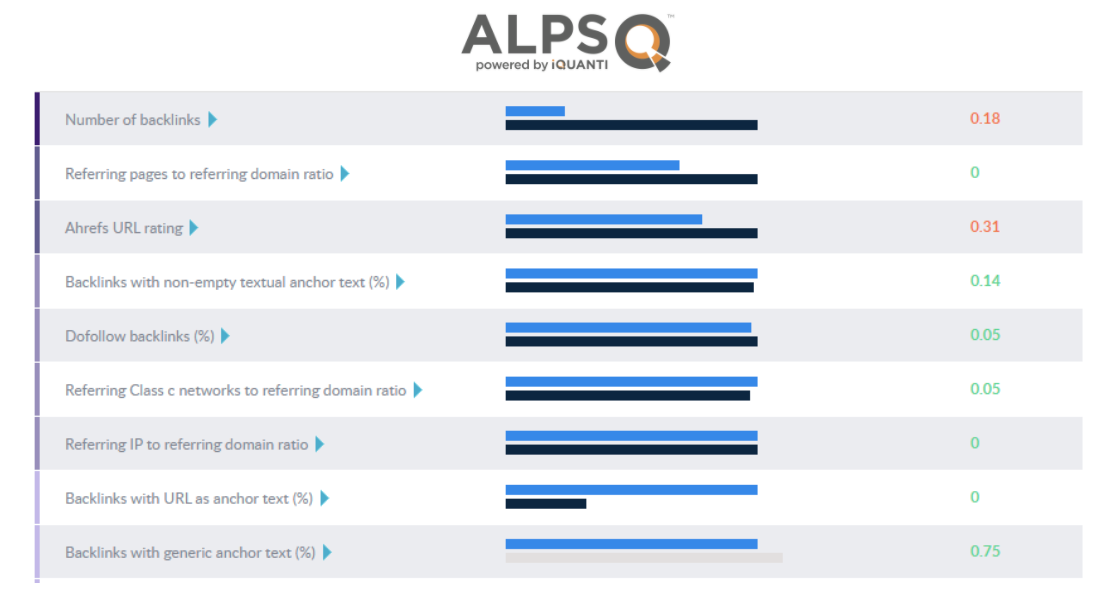
- Technical: Identify if there are any domain/page level changes.
- Parameters:
- Page load time
- How well the page is maintained
- Parameters:
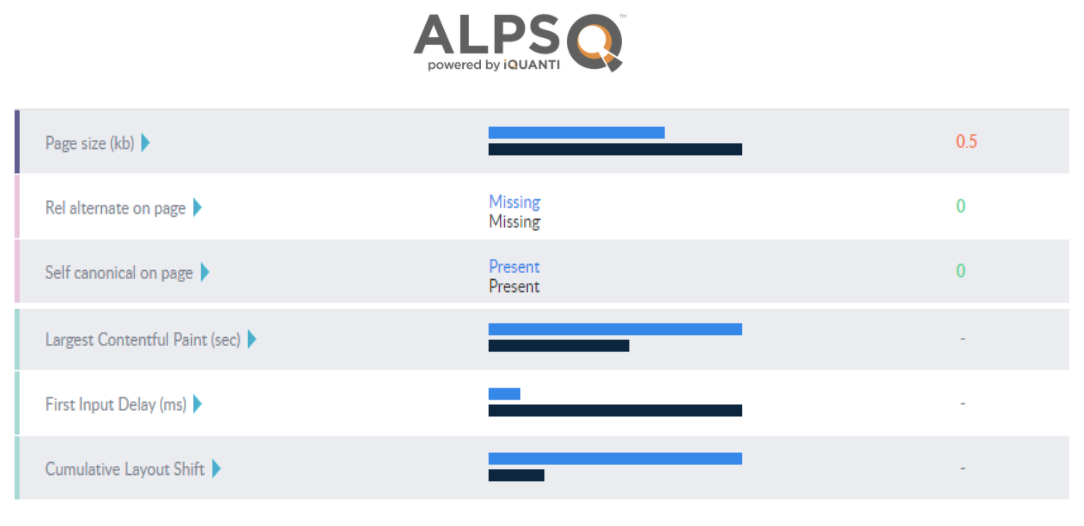
Improve Your Site’s Rankings: Key Takeaways
- Prioritize. Don’t go after everything, prioritize on the pages and parameters that are most impactful.
- Research the competition. Get ideas and inspiration from ranking competitors to make changes in the identified variables.
- Forecast. Increase the likelihood of success by rescoring and forecasting gains ahead of making changes live.
Evaluating SEO Opportunities
Need to figure out where to invest in SEO and make a business case?
Following this framework will help you evaluate SEO opportunities.
- Conduct comprehensive keyword research to produce relevant keyword list.
- Organize keywords into themes to produce a list of relevant themes.
- Identify opportunity by themes to produce a list of themes with opportunity size.
- Identify difficulty by themes to produce a list of themes with difficulty to rank.
- Prioritize themes with quick wins to produce a list of themes by effort and reward.
- Build a plan with timelines, milestones, etc. to produce an SEO plan for maximum business impact.
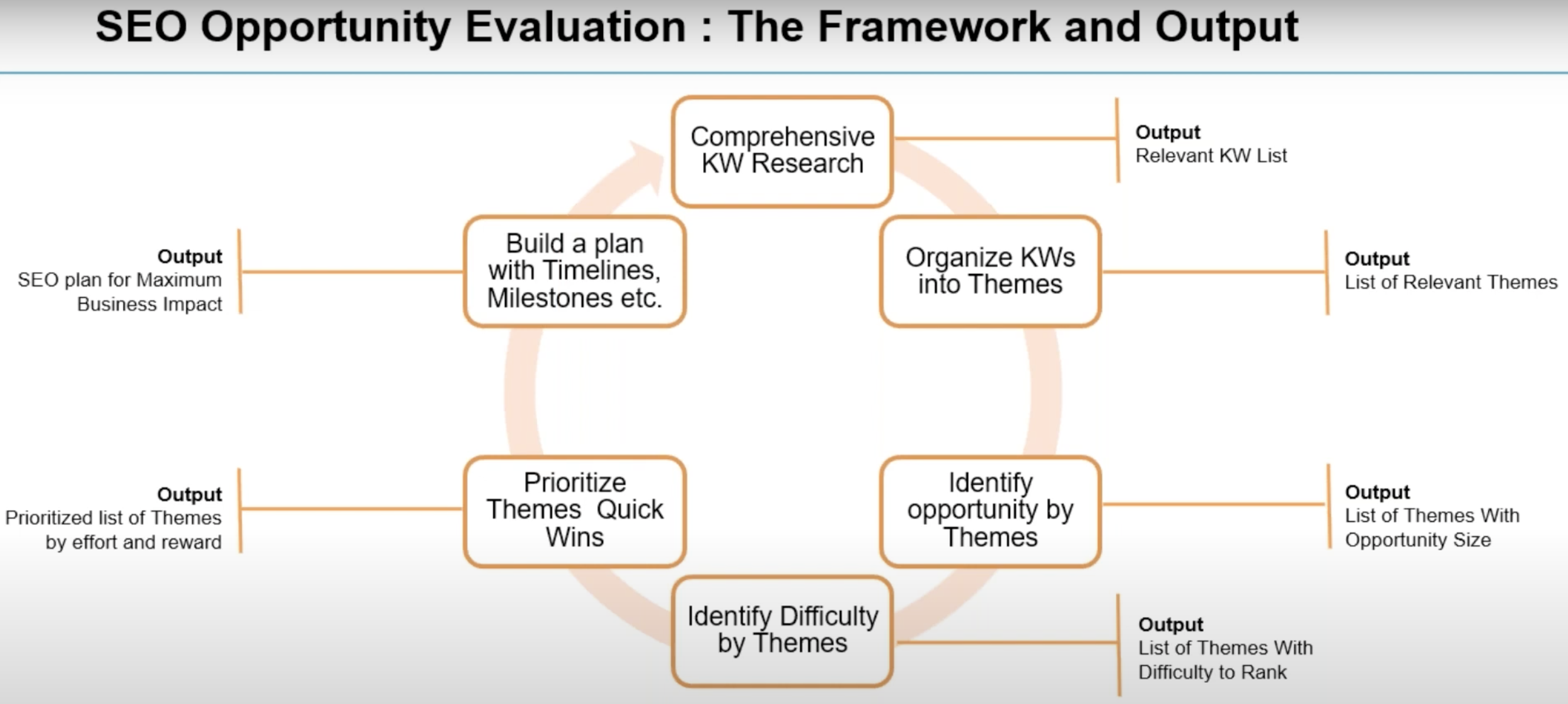
There are multiple ways to go about keyword research. The simplest approach is to use an SEO tool.
Most tools offer insights on:
- Organic footprint: Existing keywords that the site already ranks for on Google.
- Business relevancy: Keywords that are relevant to the business and products that the site should be ranking for.
- Paid converting keywords: Search queries/keywords that drive high click-through and conversions on paid search.
- Competitive research: Keywords that competitors rank for and are within their footprint.
- Search landscape: Keywords that trigger different SERP features like answer boxes, FAQs, videos, etc.
Bringing all these keywords will help you create a unique list of keywords that can be categorized into themes and sub-themes.
Here’s a look at the volume of keywords you can uncover in your research.
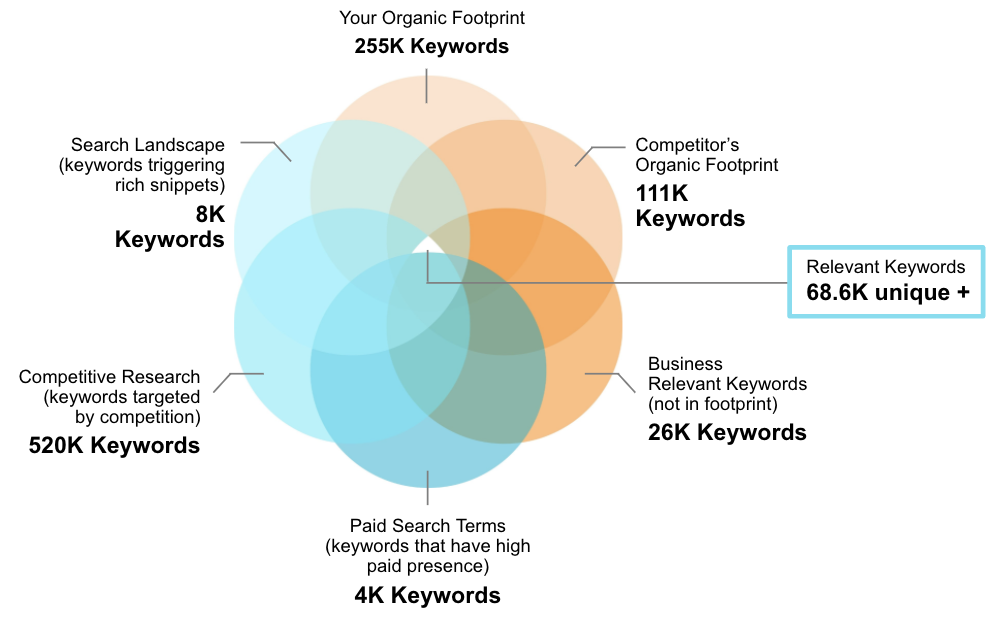
The next step is to categorize that massive list of keywords into buckets according to themes and sub-themes.
We did this process for an investment product with nearly 70K keywords.
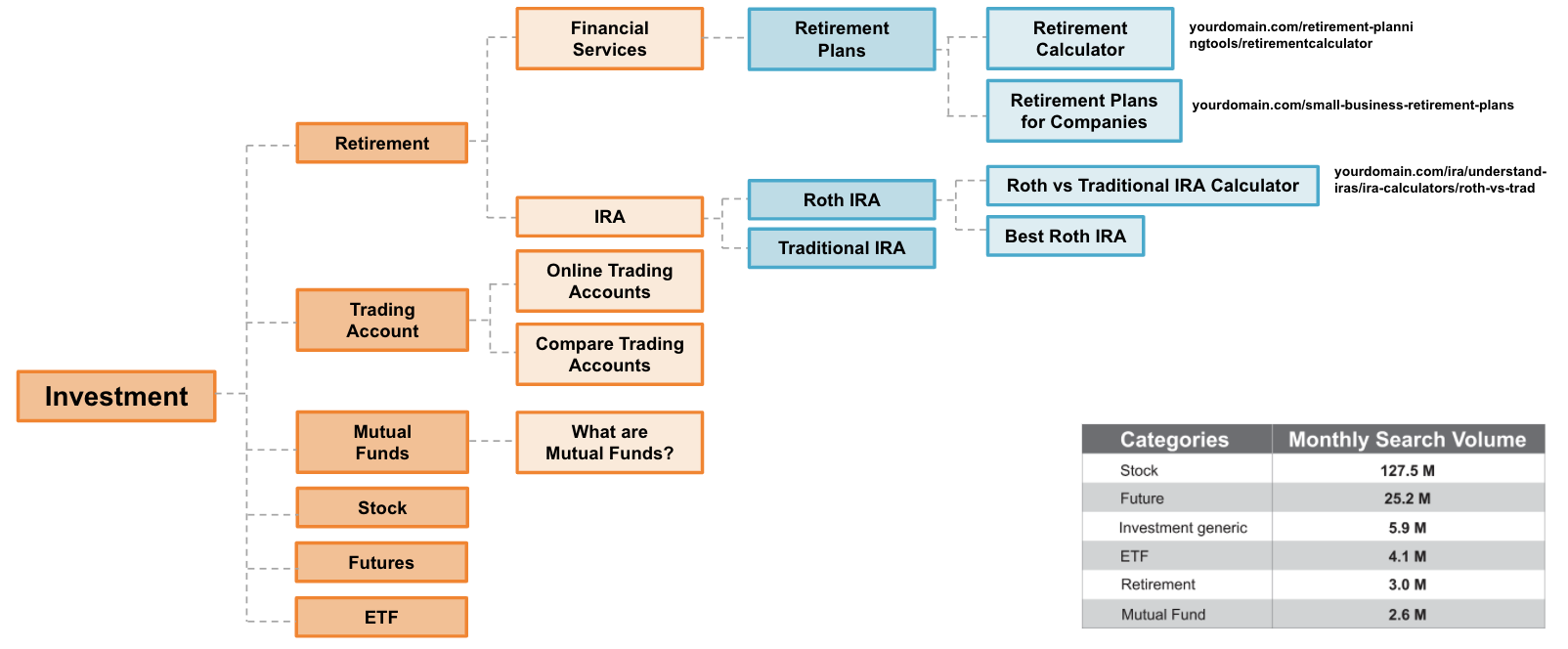
You can do theme structuring by using different dimensions, including product type, marketing funnel, business location, etc.
Identify the specific dimensions for your business and structure your themes with the most important dimensions at the top.
Once you’ve organized your keywords like this, you might end up with an Excel sheet with hundreds of rows of groups of themes.
Think of each theme as a topic – so you pretty much have hundreds of topics that you need.
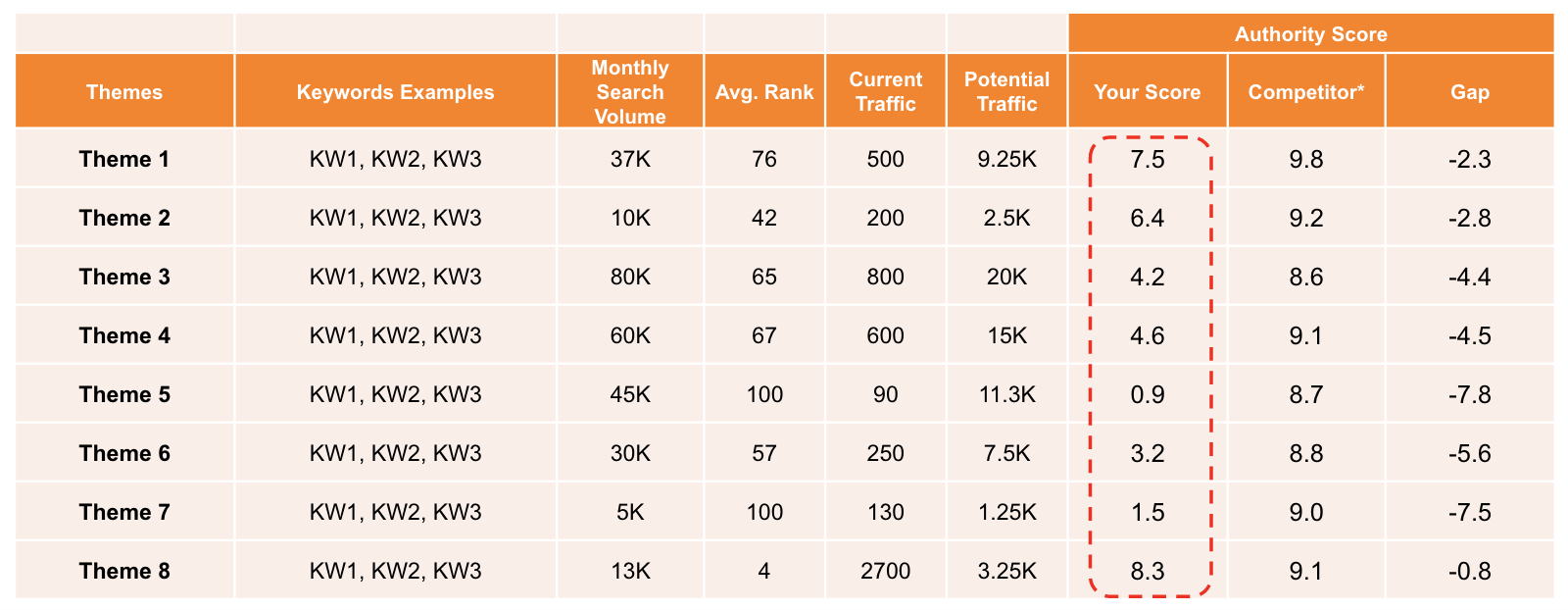
Score yourself and your competitors on each theme to identify which ones have the most potential.
You also want to analyze:
- Current annual traffic: Traffic based on current branded, and non-branded SERP rankings.
- Realistic opportunity: All branded terms on Position 1 and all non-branded terms currently ranking on positions 1-100 are elevated using ALPS Forecasting Matrix.
- Overall opportunity: All non-branded terms on Page 1 and branded on Position 1.
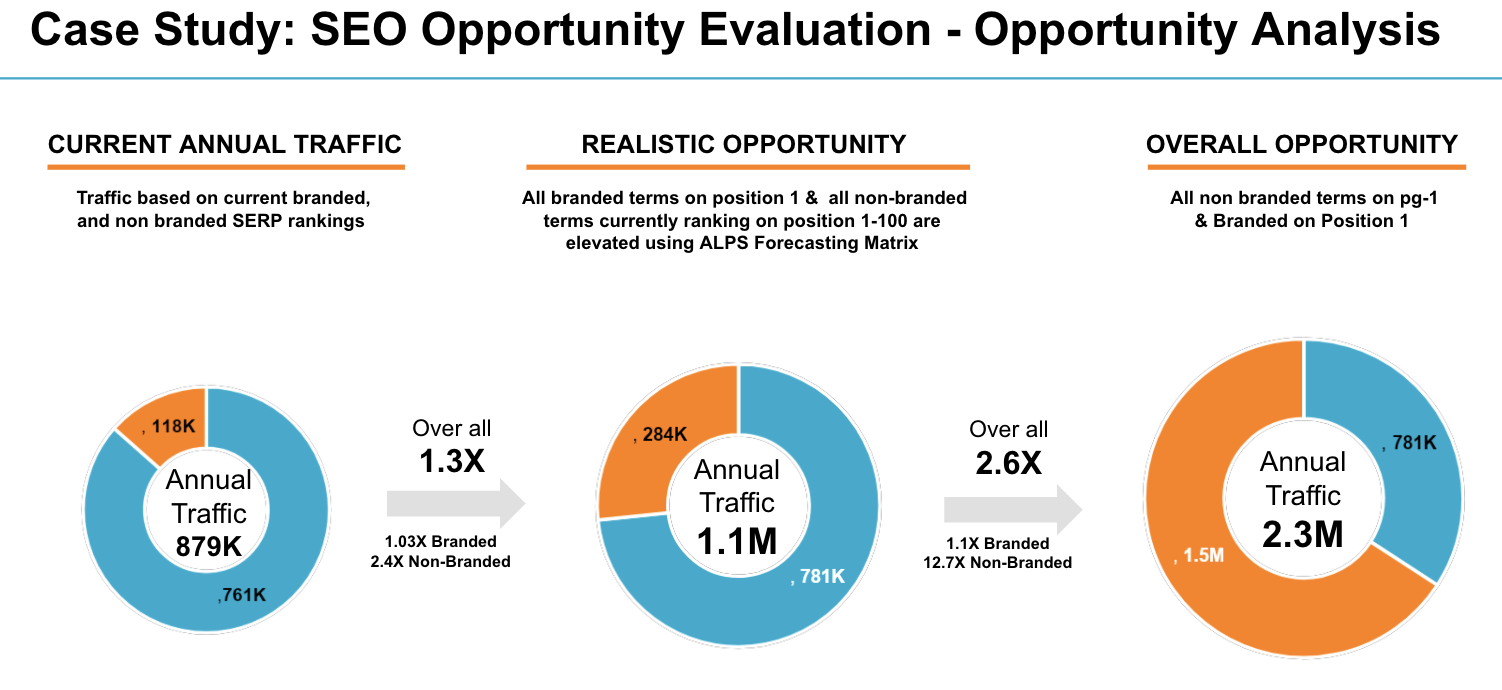
This matrix can help you prioritize depending on the opportunity size and the difficulty to rank.
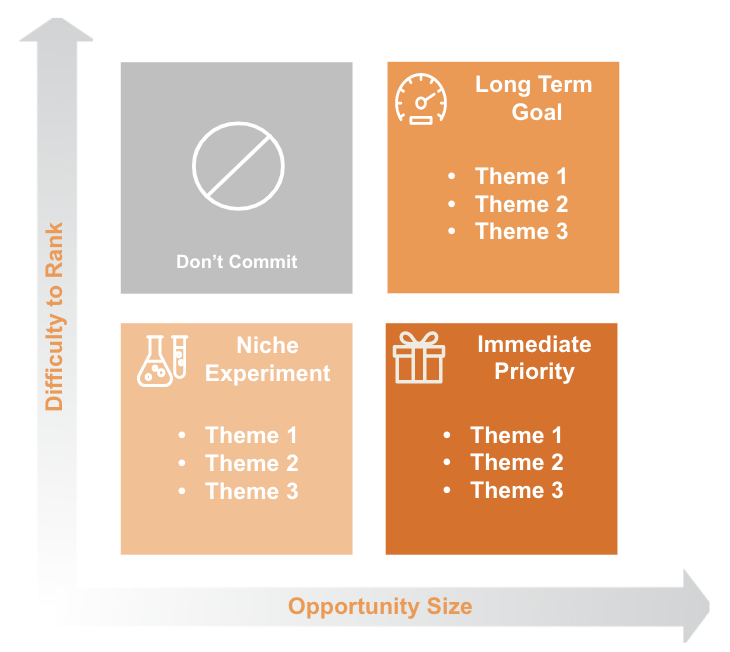
Evaluating SEO Opportunities: Key Takeaways
- ROI. Identify traffic potential and business value that SEO can drive.
- Prioritized roadmap. Identify topics to build authority around, new content that needs to be developed and existing content to be optimized.
[Slides] How to Prioritize SEO Initiatives for Greatest Business Impact
Check out the SlideShare below.
Image Credits
All screenshots taken by author, April 2021
Join Us For Our Next Webinar!
The Data Reveals: What It Takes To Win In AI Search
Register now to learn how to stay away from modern SEO strategies that don’t work.


